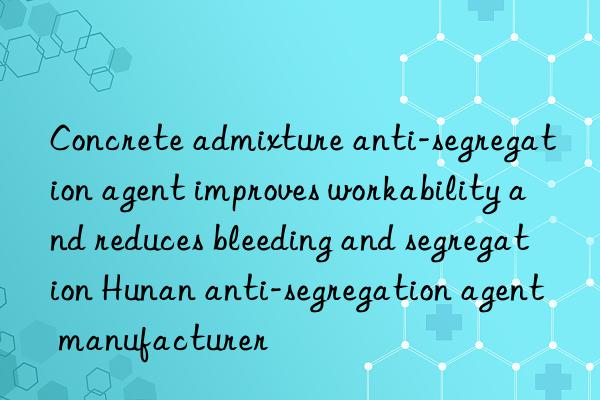
Add 5~10kg per ton of finished polycarboxylate water-reducing agent for compound use. The optimal addition amount depends on the slump requirements of the project. The product is a neutral paste, which can be well matched with ether, ester, naphthalene, polycarboxylic acid, aliphatic and other water-reducing agents, and the compound does not stratify.
Concrete admixture anti-segregation agent improves workability and reduces bleeding and segregation
Application scope, used in large-flow concrete to solve the problem of concrete caused by sand and stone grades Unreasonable mixing, excessive stone powder, machine-made sand, low glue material, low-grade large-flow concrete, bleeding, slurry, exposed sand, exposed stone, and poor waterline workability after the pumped concrete solidifies.
Workability means that fresh cement concrete is easy to operate in various construction processes (mixing, transportation, pouring, tamping, etc.) and can obtain uniform quality and dense molding. Performance, which means fluidity, cohesion and water retention. Also known as the workability of concrete.
1. Fluidity refers to the performance of fresh concrete under the action of its own weight or mechanical vibration. It can flow and fill the formwork evenly and densely. Liquidity reflects how thin the mixture is. If the concrete mixture is too dry and too thick, the fluidity will be poor and it will be difficult to vibrate and compact; if the mixture is too thin, the fluidity will be good, but delamination will easily occur. The main influencing factor is concrete water consumption.
2. Adhesion refers to the property that fresh concrete components have a certain cohesion and do not produce delamination and segregation during the construction process. Cohesion reflects the uniformity of the concrete mix. If the adhesion of the concrete mixture is not good, the aggregate and cement slurry in the concrete will easily separate, resulting in uneven concrete, and honeycombs and voids will appear after vibration. The main influencing factor is the mortar ratio.
3. Water retention refers to the ability of fresh concrete to retain water to a certain extent during construction without causing serious bleeding. Water retention reflects the stability of the concrete mix. Concrete with poor water retention can easily form permeable channels, which affects the compactness of the concrete and reduces the strength and durability of the concrete.



 微信扫一扫打赏
微信扫一扫打赏
